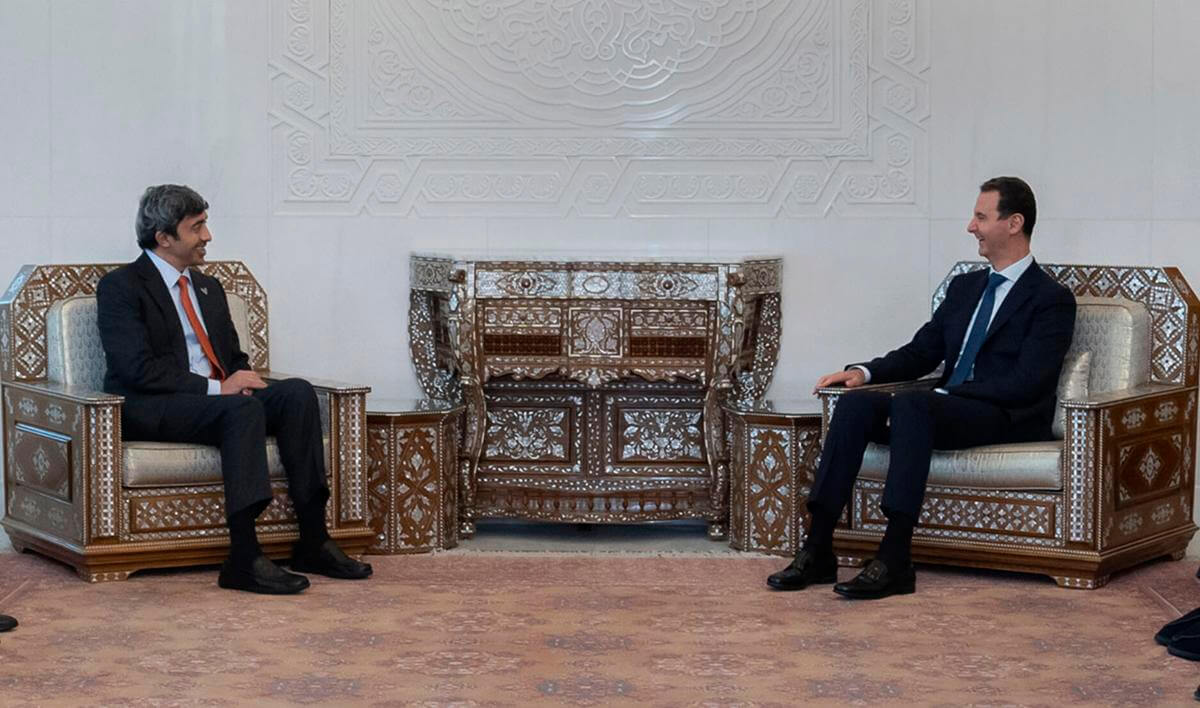United Arab Emirates (UAE) Foreign Minister (FM) Sheikh Abdullah bin Zayed Al Nahyan met with Syrian President Bashar al-Assad in Damascus on Tuesday. Sheikh Abdullah is the first Emirati dignitary to visit Syria since the civil war erupted a decade ago. The visit is thus a clear signal that the Arab world, which has largely shunned the Assad regime since 2011, is now willing to once again engage with Assad.
A statement released by the UAE’s foreign ministry stated that Sheikh Abdullah and Assad discussed the “latest developments in the Middle East and Syria” as well as a “number of regional and international issues of common interest.” Moreover, it noted that the duo “also reviewed the prospects of enhancing bilateral relations” between Abu Dhabi and Damascus.
Additionally, Sheikh Abdullah “underlined the UAE’s keenness on ensuring the security, stability and unity” of Syria. The FM added that the UAE supports “all efforts” to end the Syrian civil war and “consolidate stability in the country.”
The visit marks a major change in the UAE’s approach to the Syrian regime. Not long ago, Abu Dhabi had allied with Washington in supporting the Syrian rebels that sought to overthrow Assad. The UAE has provided armed assistance to the Free Syrian Army rebels and has even criticised the Assad government’s policies. In 2014, the Emir of Dubai, Sheikh Mohammed bin Rashid Al Maktoum, said that Assad was killing his own people and predicted the demise of the Syrian regime.
Former Emirati Minister of State for Foreign Affairs Anwar Gargash summed up Sheikh Abdullah’s visit as the UAE’s effort to “build bridges, strengthen relations, and connect what has been cut off” in the region. He added that through the visit, the UAE hopes to “spare the region more tension and ongoing conflicts.”
However, Sheikh Abdullah’s visit to Damascus was criticised by the United States (US), which has previously accused the Assad regime of committing grave human rights abuses and has sanctioned several Syrian officials. US State Department spokesperson Ned Price said on Tuesday that Washington is “concerned by reports of this meeting and the signal it sends” and that the Biden administration “will not express any support for efforts to normalise” ties with the “brutal dictator,” referring to Assad.
Furthermore, Blinken urged states in the region to “carefully consider the atrocities that this regime, that Bashar al-Assad himself has perpetrated on the Syrian people over the last decade” before normalising relations. “When it comes to our position on the Assad regime […] we will not normalise or upgrade our diplomatic relations with the Assad regime,” Price added.
However, the US’ opposition to normalising ties with the Assad regime, has not stopped its Arab allies from slowly warming up to Syria, especially as the regime has recaptured a lot of the area it initially lost to the rebels. Last month, Jordanian King Abdullah II met with Assad to discuss ways to enhance cooperation and re-establish ties. Egypt and Lebanon have also been making efforts to strengthen ties with Assad’s regime.
The Syrian regime has also welcomed the increasing closeness of its Arab neighbours, especially since its economy has been devastated by a decade of war and worsened by the COVID-19 pandemic.
The brutal conflict in Syria has killed close to 400,000 people, forced more than five million to flee as refugees, and displaced another six million within the nation’s borders. The United Nations (UN) estimates suggest that more than 13 million people require humanitarian assistance in Syria, along with 90% of all children in the country. Although Assad has managed to cling to power since the war began in 2011, prospects for lasting peace in the country remain dim, with no progress oon peace talks or UN-led efforts to draft a new constitution.
UAE’s FM meets Assad in Damascus, Indicates Arab States Willing to Engage With Syria
The United States criticised the FM’s visit and said it will not normalise or upgrade ties with Assad’s “brutal” regime.
November 10, 2021

UAE FM Sheikh Abdullah bin Zayed Al Nahyan (L) meets Syrian President Bashar al-Assad in Damascus, Syria SOURCE: UAE Ministry of Foreign Affairs
